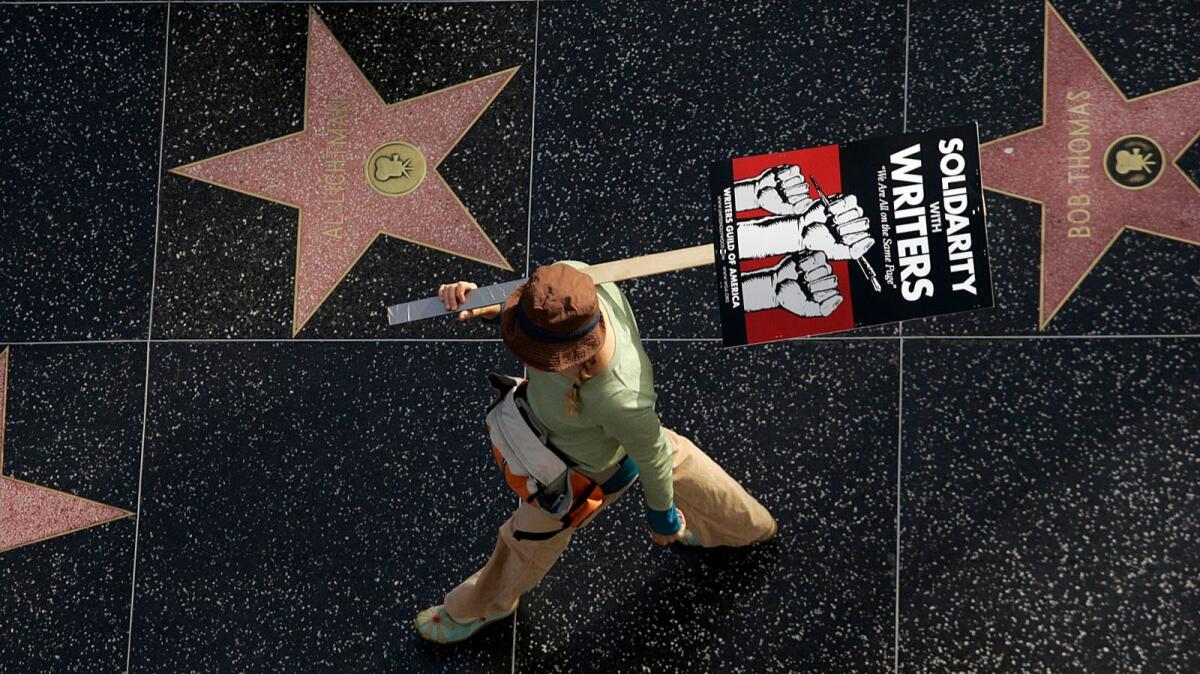Writers Guild of America starts contract talks as streaming pay takes center stage

- Share via
Amid a tense labor atmosphere in Hollywood, the Writers Guild of America began contract negotiations Monday in what is expected to be a tough round of talks as the industry continues to grapple with digital upheaval.
The WGA, which counts about 13,000 members between its East and West Coast guilds, is sitting down at the Sherman Oaks headquarters of the Alliance of Motion Picture and Television Producers, which represents the major studios, TV networks and independent producers.
The closed-door talks will focus on a new contract to replace the current three-year agreement that was reached in 2014 and expires May 1.
Experts say that residual payments related to streaming services like Netflix, Amazon and Hulu are likely to be among the biggest points of discussion in the days ahead.
Guilds like the WGA want to “make sure their members are being paid in a way that’s commensurate with the money studios are making off of streaming video,” said Dan Stone, an attorney at Greenberg Glusker who specializes in entertainment and media.
With traditional movie and TV distribution, there was a certain level of financial transparency that enabled unions to work out residual payments with the studios, said Stone, who previously served as assistant general counsel at the Directors Guild of America.
“But that transparency hasn’t been there for the streaming services,” he said. “It’s mostly subscription-driven so it’s been difficult for the guilds to come up with a residuals formula.… You never know what’s going on inside the room … but the WGA seems to have been signaling to its membership that it’s willing to go to the mat on this issue.”
The WGA negotiations come at a time when other guilds are dealing with the issue of new-media residuals, the payments that talent receives when their work is rerun on digital platforms.
In January, the Directors Guild of America ratified a new three-year contract that included a boost in residuals from streaming video services. The DGA didn’t disclose the terms of the agreement but said the deal more than triples residuals for members working on original content for the biggest streaming companies.
The subject of streaming residuals is also expected to take center stage when SAG-AFTRA begins its own contract negotiations this spring. The actors union is striking against several video game companies over residual payments and safety issues.
In the tight-knit world of Hollywood labor, the major guilds often take cues from each other in what is called “pattern bargaining,” where one union uses the gains of another as leverage.
For film and TV writers, the current atmosphere is rather anxious as many worry about their economic future, said David Smith, associate professor of economics at the Pepperdine Graziadio School of Business and Management.
“My sense is that they’re frustrated in light of stagnant to moderate earnings over the years compared to pretty healthy profit margins from major studios,” he said. “It’s important for [writers] to have any threat of a strike be credible. Some of it is posturing. But there is legitimate concern.”
Smith added that the WGA negotiations are also likely to feature discussion of its pension plan.
Representatives of the WGA and Alliance of Motion Picture and Television Producers declined requests for comment.
The last major WGA strike was the 2007-08 walkout that lasted 100 days and paralyzed much of the industry. The work stoppage affected movie and TV production and took on a celebrity dimension when a number of actors and TV personalities joined the screenwriters on the picket lines in a show of solidarity.
The longest walkout in the guild’s history was its 1988 strike, which lasted 155 days.
More to Read
Inside the business of entertainment
The Wide Shot brings you news, analysis and insights on everything from streaming wars to production — and what it all means for the future.
You may occasionally receive promotional content from the Los Angeles Times.











